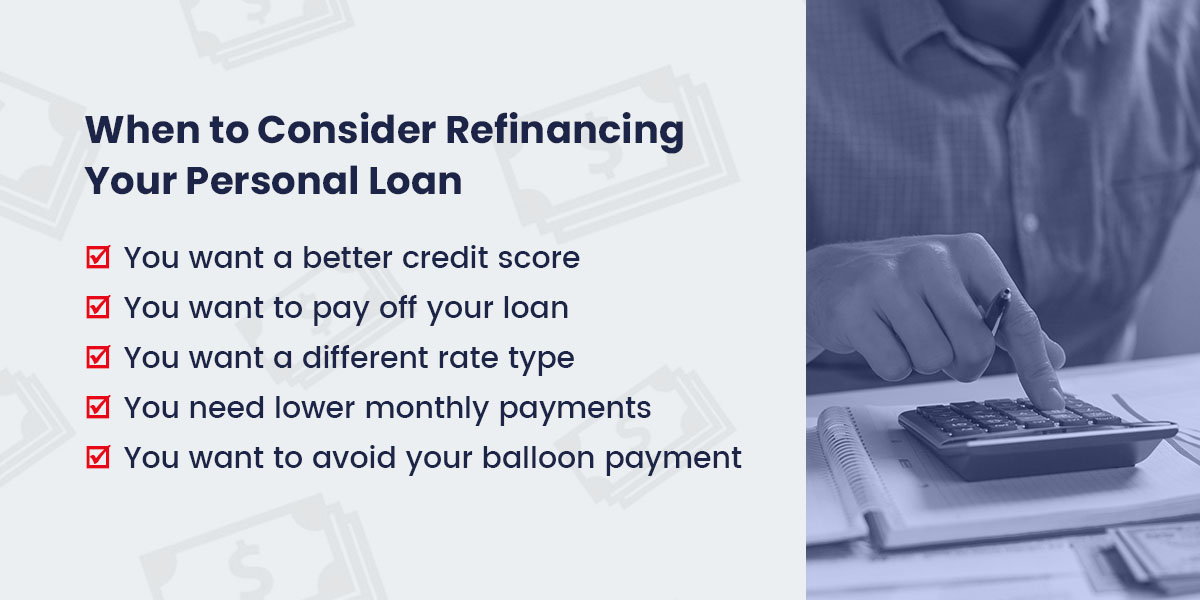
Personal loans help you pay off debt, cover major expenses like home repairs, and enable you to make big-ticket purchases. You repay the loan in monthly installments and the interest rate you receive during your application.
You can potentially enhance your financial health by exploring and understanding the considerations, advantages, and steps in the loan refinancing process. Learn more about the nuances of refinancing your personal loan, as well as the advantages, considerations, and impact on your credit score.
What It Means to Refinance a Personal Loan
When you refinance a personal loan, you essentially replace your current loan with a new one. The replacement likely has more favorable terms and can save you money.
For example, say your loan of $6,000 has an annual percentage rate (APR) of 10% that you must pay over five years. Your monthly payment is $128, totaling $7,680 at the end of the five years. At the beginning of year two, market rates fall, and you're able to refinance your loan at a lower rate of 7%. Your monthly payment at the start of year two becomes $119, or $1,428 yearly. The total after five years becomes $7,248 rather than $7,680, saving you $432 in total interest.
The longer it takes to refinance, the less interest you'll save. The new loan's terms will end on the same date as the original loan — it is not another five-year loan.
Loan Refinancing vs. Loan Restructuring
Restructuring a loan involves modifying an existing loan's terms. It may include extending the payment period, changing the loan structure, or adjusting interest rates. Individuals who want to fulfill their obligations despite financial challenges sometimes opt for loan restructuring. However, it's important to note that restructuring a loan can negatively impact credit since it involves renegotiating the amount owed to a lower amount.
Loan Refinancing vs. Debt Consolidation
Debt consolidation combines multiple debts into a single loan with a lower interest rate. It makes repaying the loan simpler and more manageable. These loans can be refinanced down the line.
The Impact of Personal Loan Refinancing on Credit Scores
Refinancing your loan subjects you to a credit check, which can lead to a slight, temporary credit score drop. Practicing good financial habits with the new loan will help rebalance your credit score. However, you'll still want to be mindful of your timing. For example, if you want to move into a new apartment or finance a new car, it's better to do that before or after refinancing your personal loan. Furthermore, while it's possible, refinancing your personal loan many times will briefly hurt your credit score. So approach with careful consideration.
Your credit score depends on several factors, including:
- Your payment history.
- The amount you owe.
- Your credit history length.
- Your new credit.
- Your credit mix.
- Your credit utilization, or how much of your available credit you use.
The length of your credit history is a factor that helps you maintain your credit score, and this is where refinancing your personal loan can help. You can potentially get lower rates and lengthen your terms to lower your monthly payment.
The Pros and Cons of Refinancing a Personal Loan
While loan refinancing offers some significant benefits, you must weigh the pros and cons before making a final decision. Ensure that the new loan aligns with your financial objectives, and always do your research before taking on a new loan.
Advantages of Refinancing a Personal Loan
You may secure a lower interest rate that reduces your overall cost and, by extension, your monthly payments. You can often find more flexibility by negotiating more favorable terms like fixed interest rates and getting more control over your debt.
Disadvantages of Refinancing a Personal Loan
Without careful consideration, you might end up increasing the total interest you pay over the life of your loan. Also, take note of any upfront costs that can increase your loan, like application fees or closing costs that can affect your overall savings. Lower monthly payments can tempt you to take on more debt, negatively impacting any financial challenges you face. Variable interest rates may rise due to market conditions, so consider your rates carefully.
When to Consider Refinancing Your Personal Loan
Refinancing is beneficial when it aligns with your financial goals, like lowering expenses or consolidating your debts yourself. Always thoroughly assess your economic cir
cumstances and how refinancing will fit into your broader financial strategy. The most significant appeal of this loan option is saving money, but you can also consider refinancing your personal loan if any of the following applies to you:

- You want a better credit score: If you want a better credit score by building credit or already have one and want a lower interest rate, refinancing your personal loan will help you achieve this.
- You want to pay off your loan: With higher monthly repayments, you can pay off your loan well before your term ends. The lower interest rates on a new loan make this possible.
- You want a different rate type: You can switch from a variable to a fixed interest rate for more stability in your repayment.
- You need lower monthly payments: To take the strain off your budget, you can consider refinancing your loan. You can lower your monthly payments with a higher credit score or longer repayment term.
- You want to avoid your balloon payment: By repurposing your debt into a different loan vehicle or modifying your loan terms, you can bypass balloon payments, which are essentially one-time payments made at the end of the loan term that are larger than usual.
How to Refinance Your Personal Loan
Refinancing a loan is a strategic process you follow to optimize your financial terms. Understanding this process extends beyond when you receive the funds you need — you must be intentional about making consistent payments to benefit from your new loan rates and terms. Take the following steps when you're ready to refinance your personal loan:
- Determine how much you need: If you just want to pay off your loan faster, this will be easy to determine. Just keep in mind that your new loan may come with an origination fee.
- Consult your credit score and report: Any positive change in your credit score may qualify you for a better interest rate. You can request your credit score report to see if there are any adjustments.
- Shop for favorable rates and terms: Compare offers from various lenders to find rates and terms that suit your capabilities.
- Fill out your application: Finally, complete your application and wait for approval. Once you receive your funds, you can use them however you need to and start making payments on your new loan.
Apply With Atlas Credit Today
Whether you want to lower your monthly payments, simplify your debt structure, or increase your credit score, understanding the possibilities of refinancing a loan is essential. It can take you one step closer to reaching your financial goals and help you repay your loan fast. If you decide to refinance your loan, ensure that you are saving money through a lower interest rate.
Whether you want to refinance your personal loan or take out a new loan, Atlas Credit can help. When you apply online, one of our knowledgeable customer service representatives will call to confirm your information. If approved, you'll be able to eSign your documents to make the process even faster. Apply for a loan from Atlas Credit online today!




